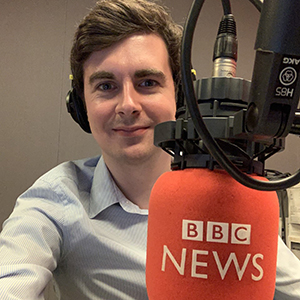Tom Hourigan – BA French and History, BBC News

What degree course did you study?
French and History.
Why did you choose that particular degree course?
I was always an arts-loving student at secondary school and did well in foreign languages and history at GCSE and A Level so combining the two seemed to be an obvious route for me to follow. When I started applying for degree courses I didn't have a firm career in mind, but knew having another language would potentially be very useful.
Tell us about your employer
I work for BBC News - the country's largest broadcast news provider serving everyone in the UK, regardless of their location or background.
I'm a senior broadcast journalist working on the BBC's main national radio stations - including Radio 4. I produce news bulletins on the main programmes such as Today and The World At One which reach millions of listeners, and I read the news myself on Radio 2 and 6 Music. I also act up to assistant editor on a regular basis - meaning I lead the production teams I'm part of.
What attracted you to this position?
I've worked in radio all my professional life, spending time at different news organisations across the UK, and I can't imagine doing anything else. My job is challenging, sometimes stressful but always engaging. Every day is genuinely different and I'm immensely privileged to be in a position where I'm telling huge numbers of people what's going on in the world.
What are the key skills you learnt at Warwick that have helped you with your career to date?
The critical thinking skills I learned at Warwick have been crucial to my work as a journalist. My job requires me not to take things at face value, but to question and to look beneath the surface - and studying a subject like history, where you're constantly evaluating the relative strengths and weaknesses of sources, has been very useful. I haven't used my French as much as I'd have liked to, but it's come in handy when covering major international stories such as the Bataclan attacks in 2015 and when I covered the French presidential election in 2017 live from Paris.
What has been your greatest career challenge to date and how did your experience and skills help overcome it?
There have been countless challenging moments in my career - typically involving major breaking news and the need to react quickly and accurately. Over the years I've learned three valuable lessons: to react calmly, to communicate constantly with the team around me and - in a world of constant deadlines - to keep thinking one step ahead. A lot of this comes with experience, but I've also learned to adapt my character to fit the moment.
What top tips would you give to students looking for a career in your market sector?
Journalism is extraordinarily competitive and - for the most part - there are more candidates than jobs available. You have to really want to do it - so getting stuck into student media and making sure it's the professional for you is vital. Consider whether you want to boost your chances of success by completing a formal journalism qualification once you leave Warwick - despite the extra expense. Try to make as many contacts as you can, and if you're given opportunities to undertake placements, come up with as many original ideas as you can - more than ever journalism is now an ideas business.
What do you know now that you wish you had known when you were applying for jobs?
Never pretend you've heard or seen something in an interview if you haven't - otherwise you'll very quickly be found out.
